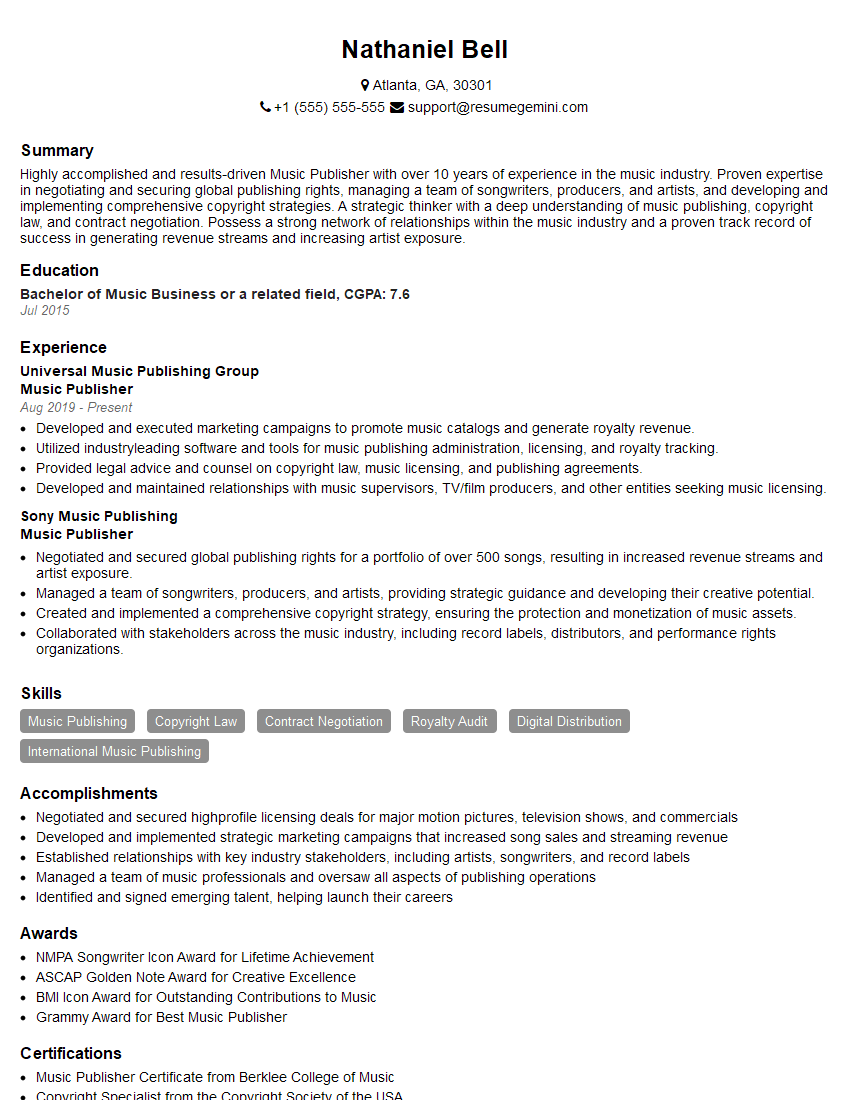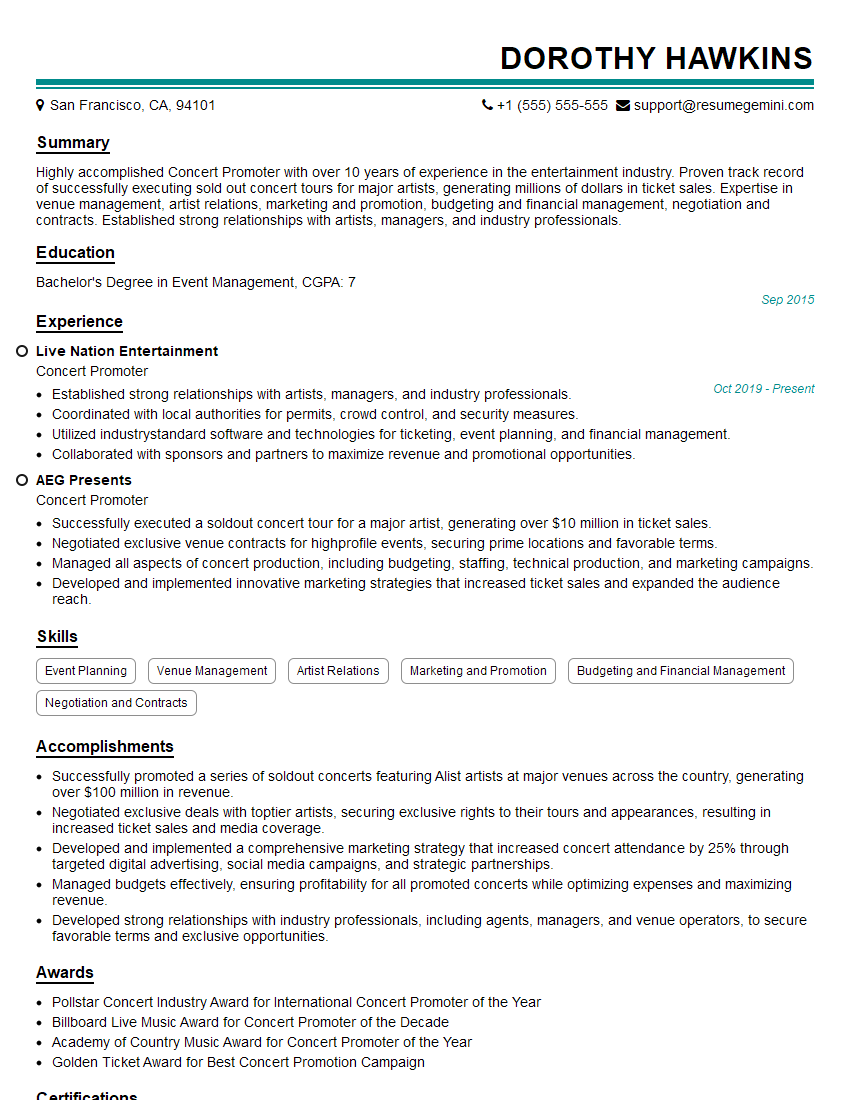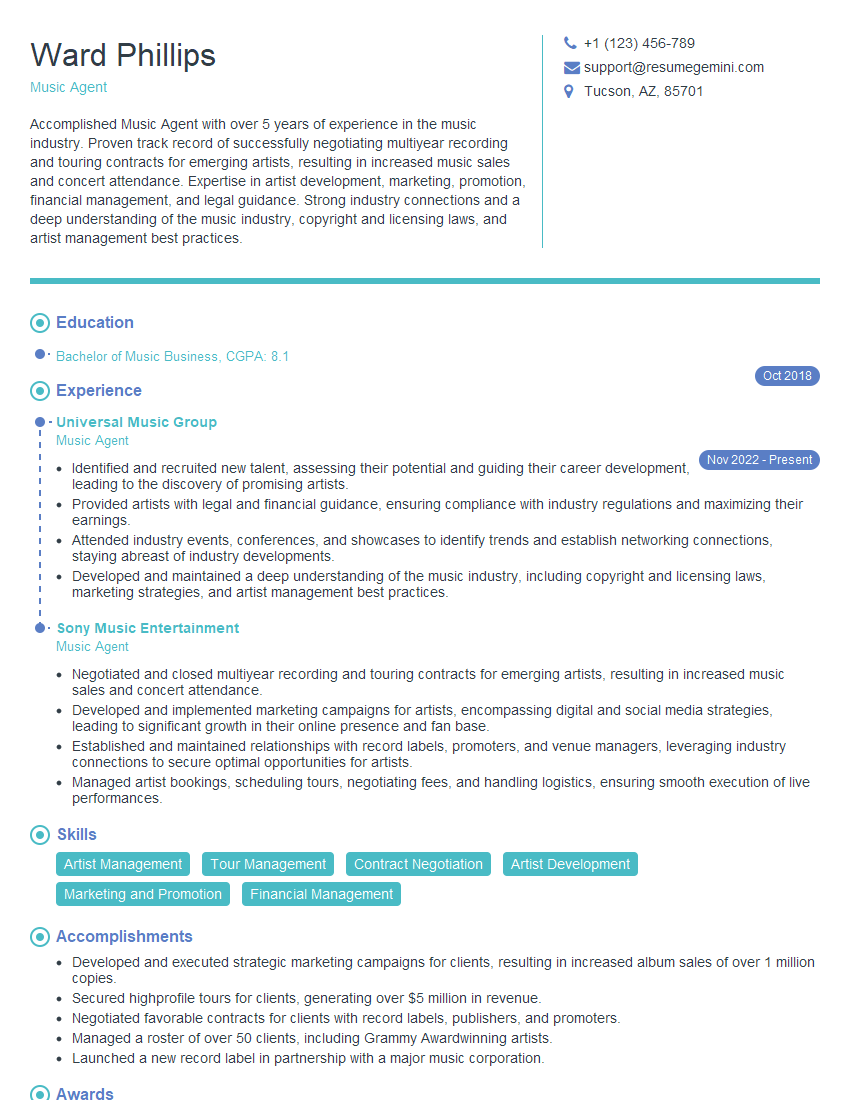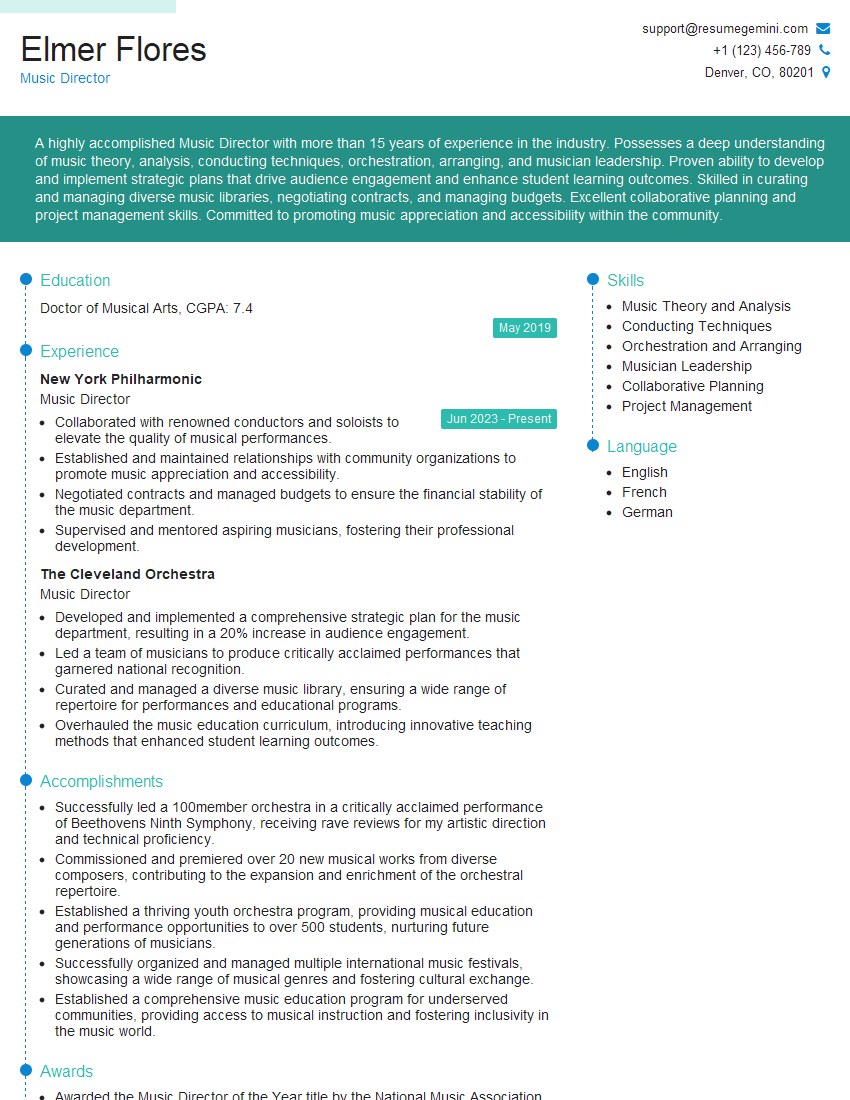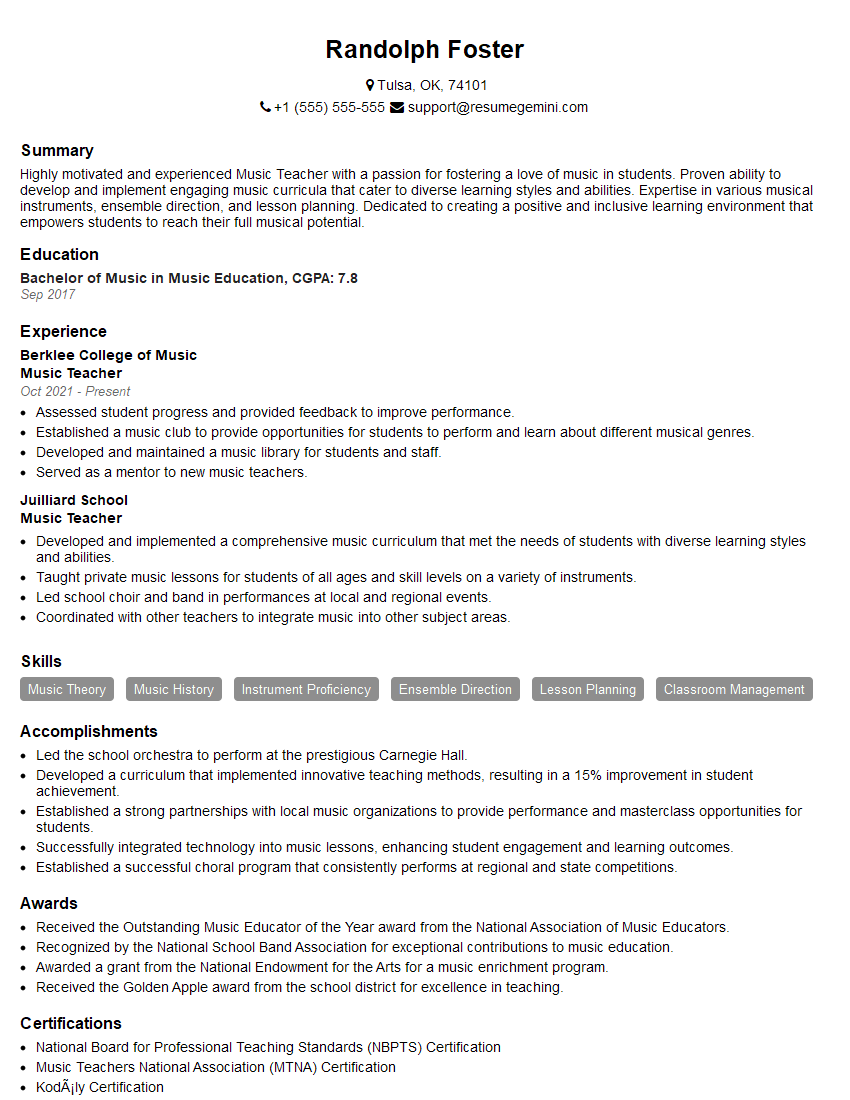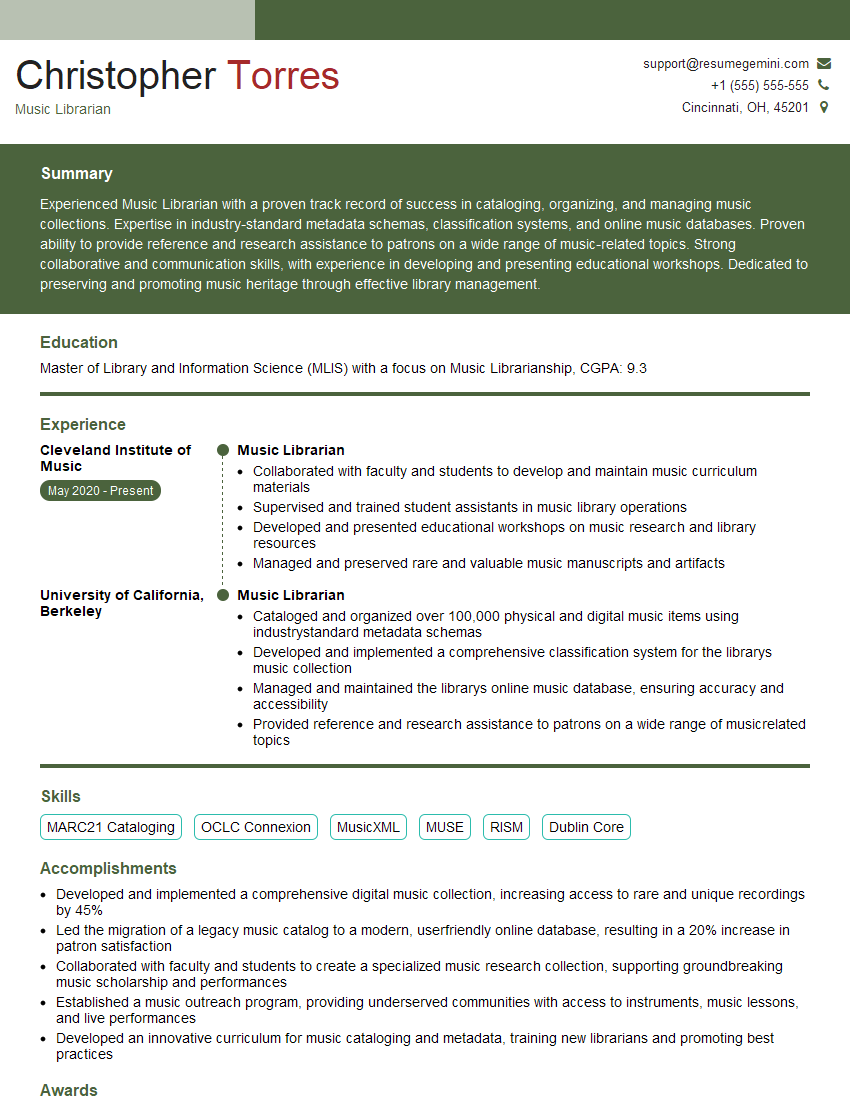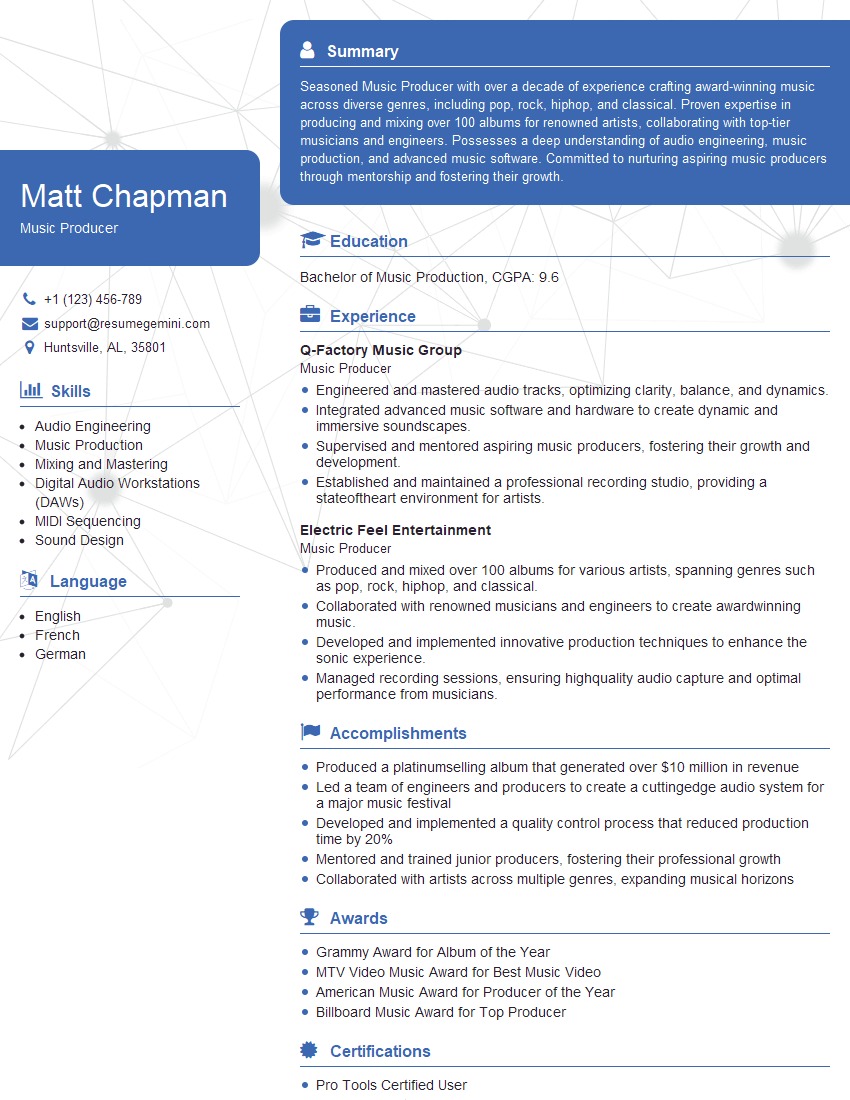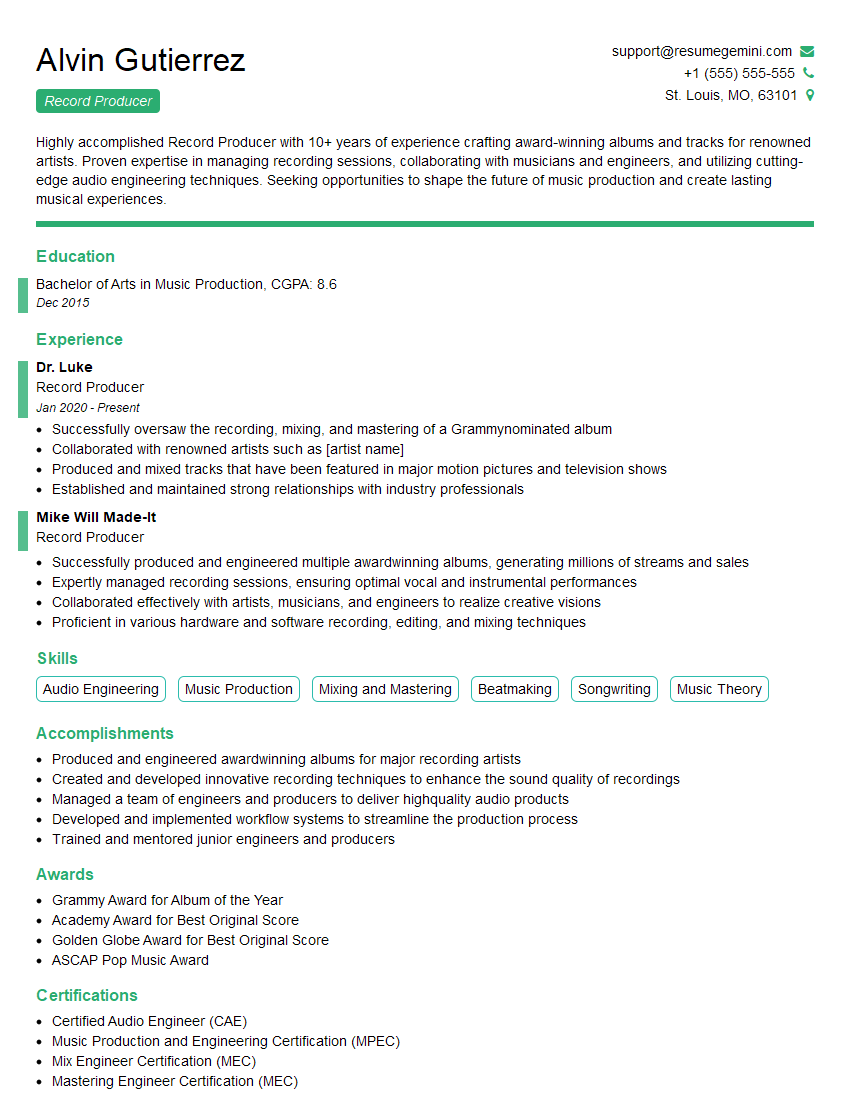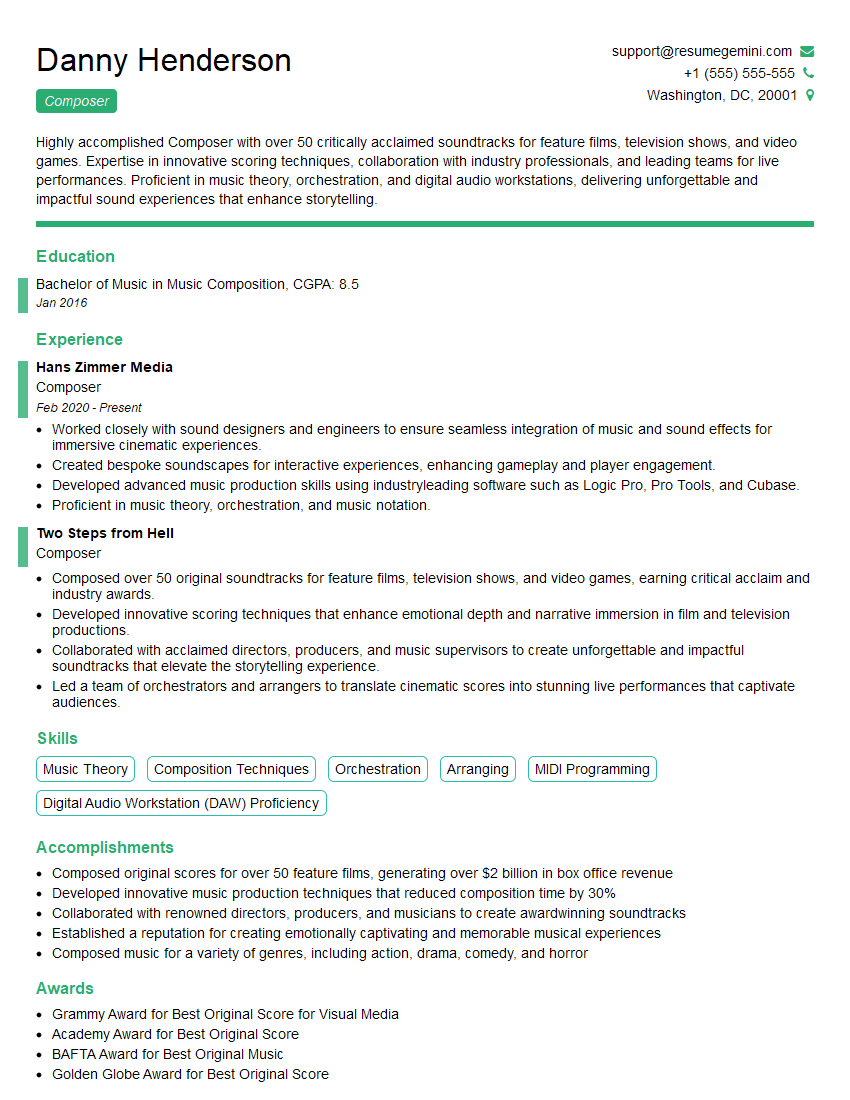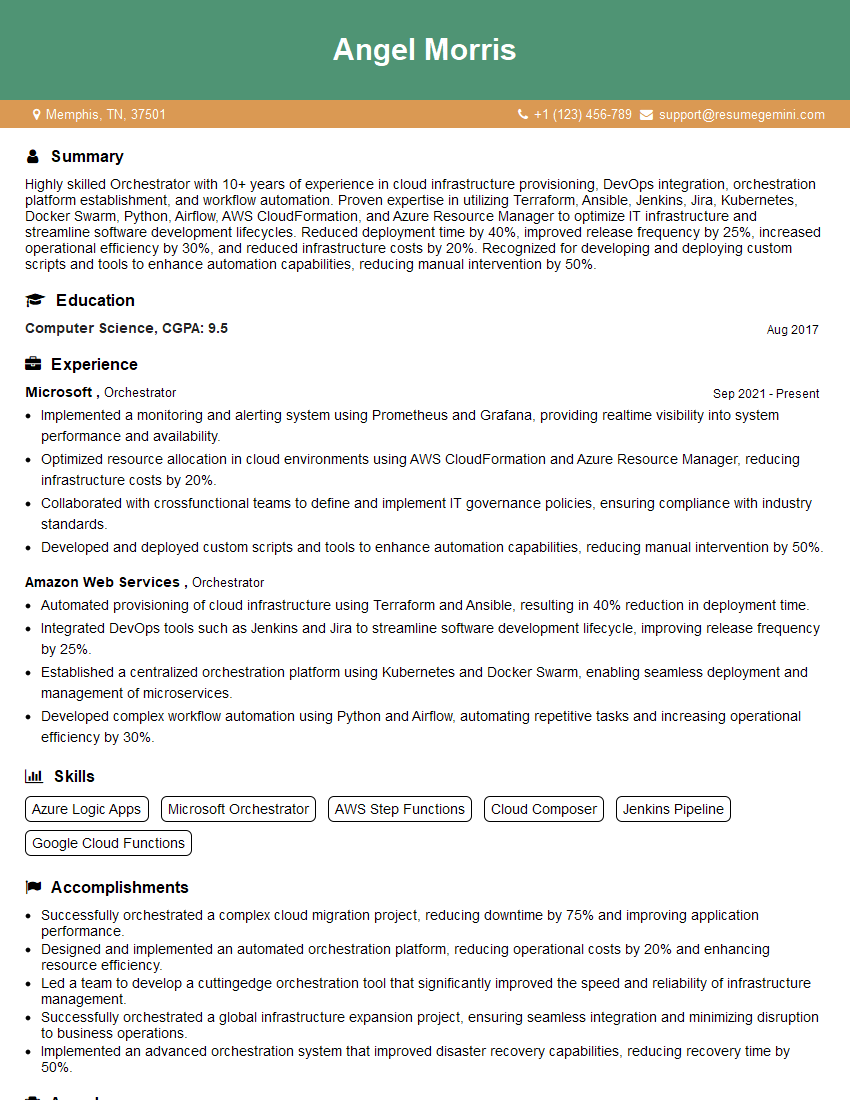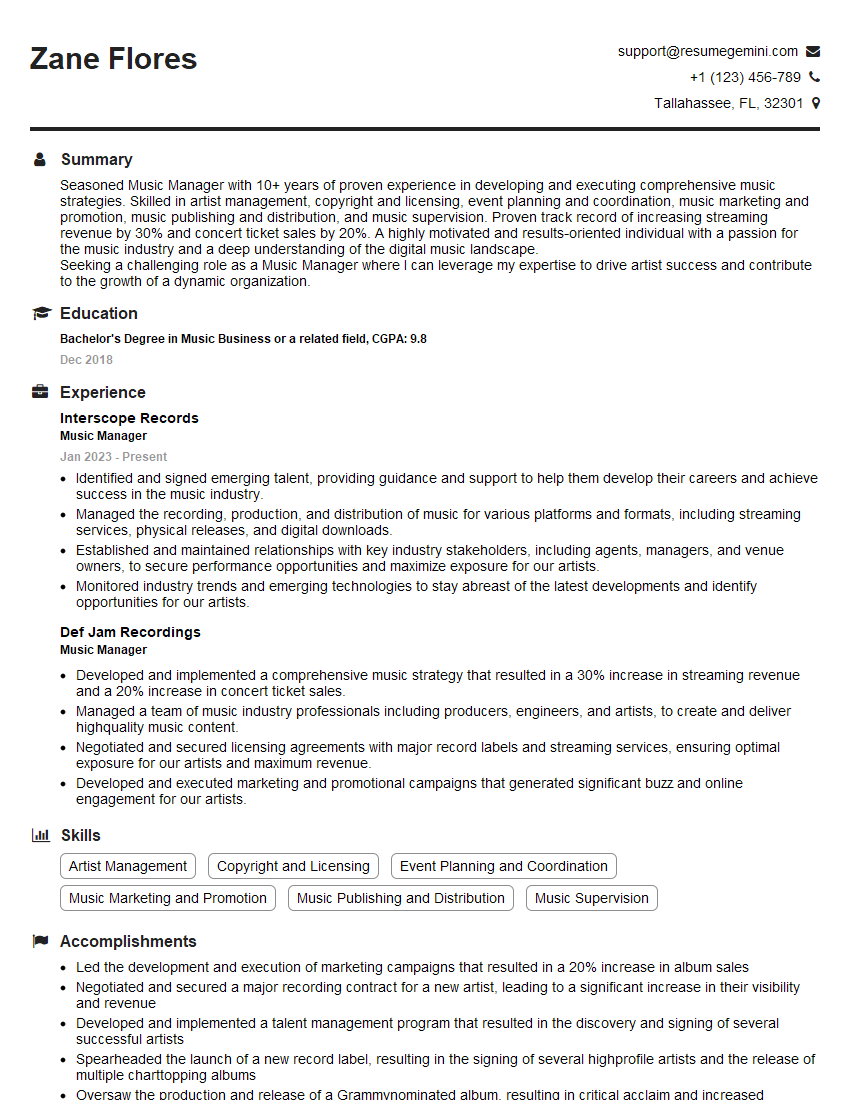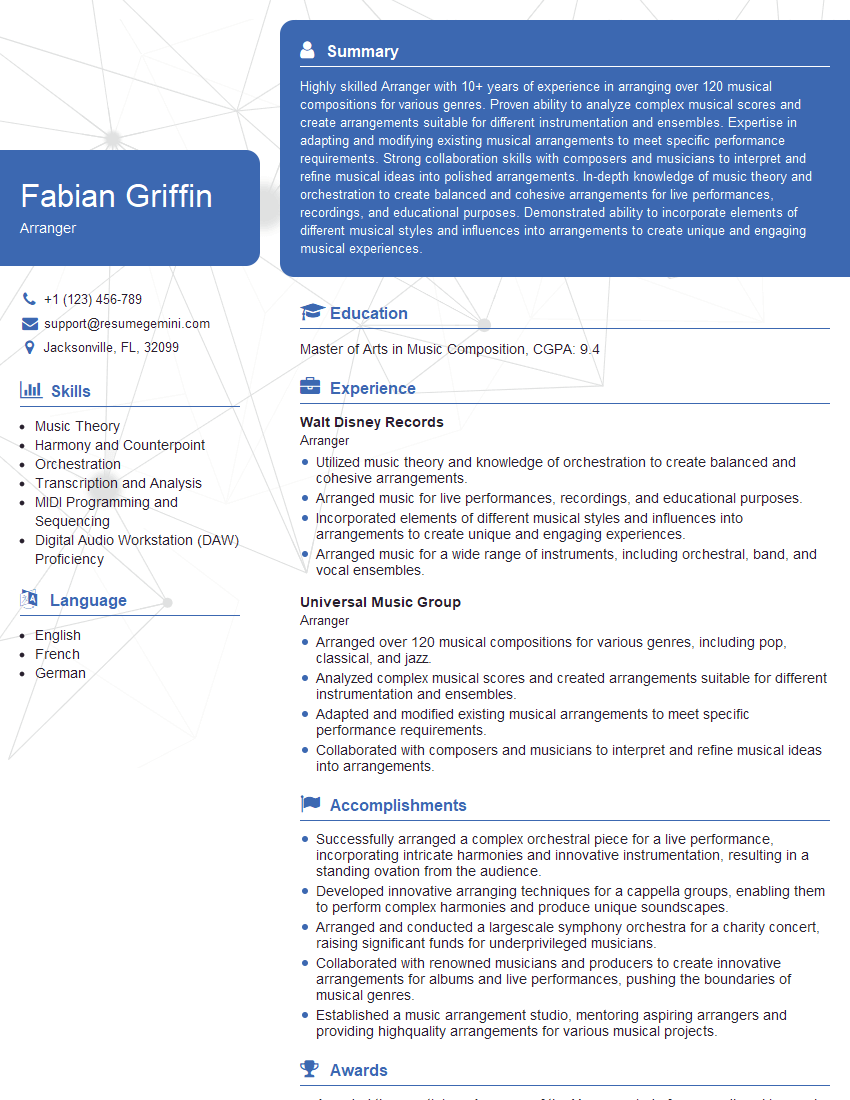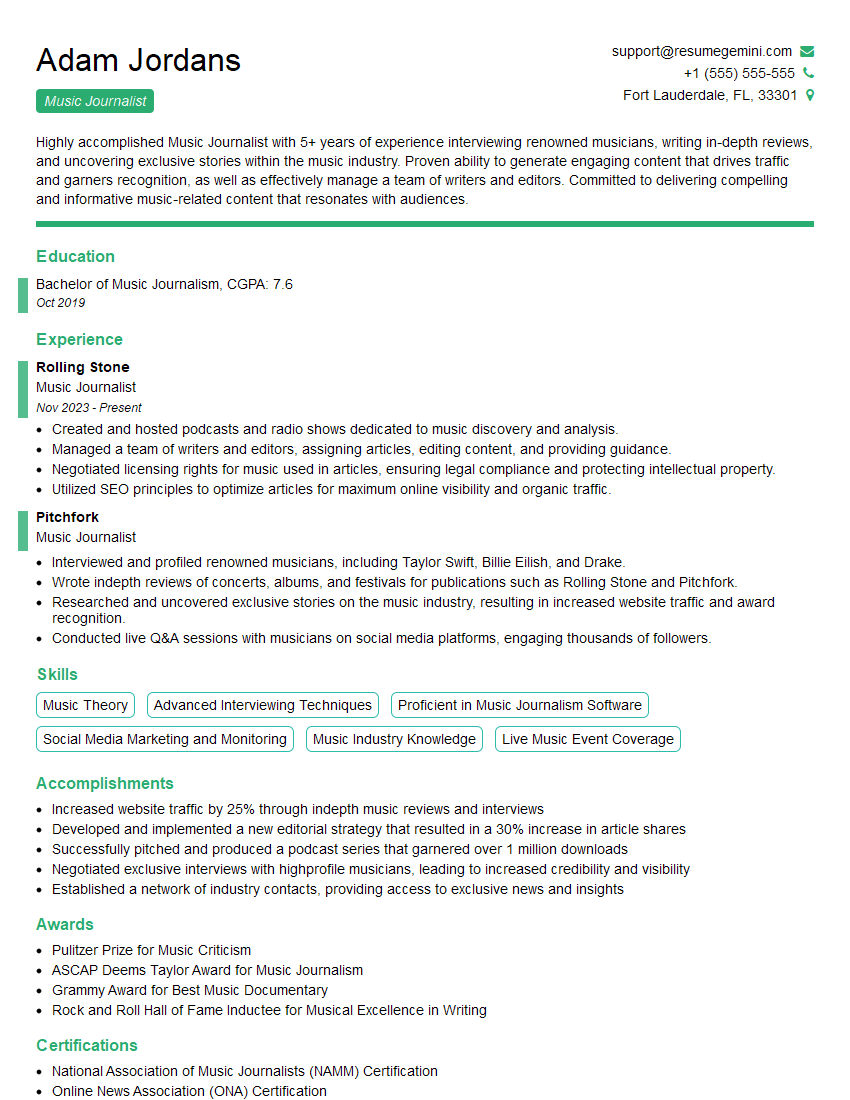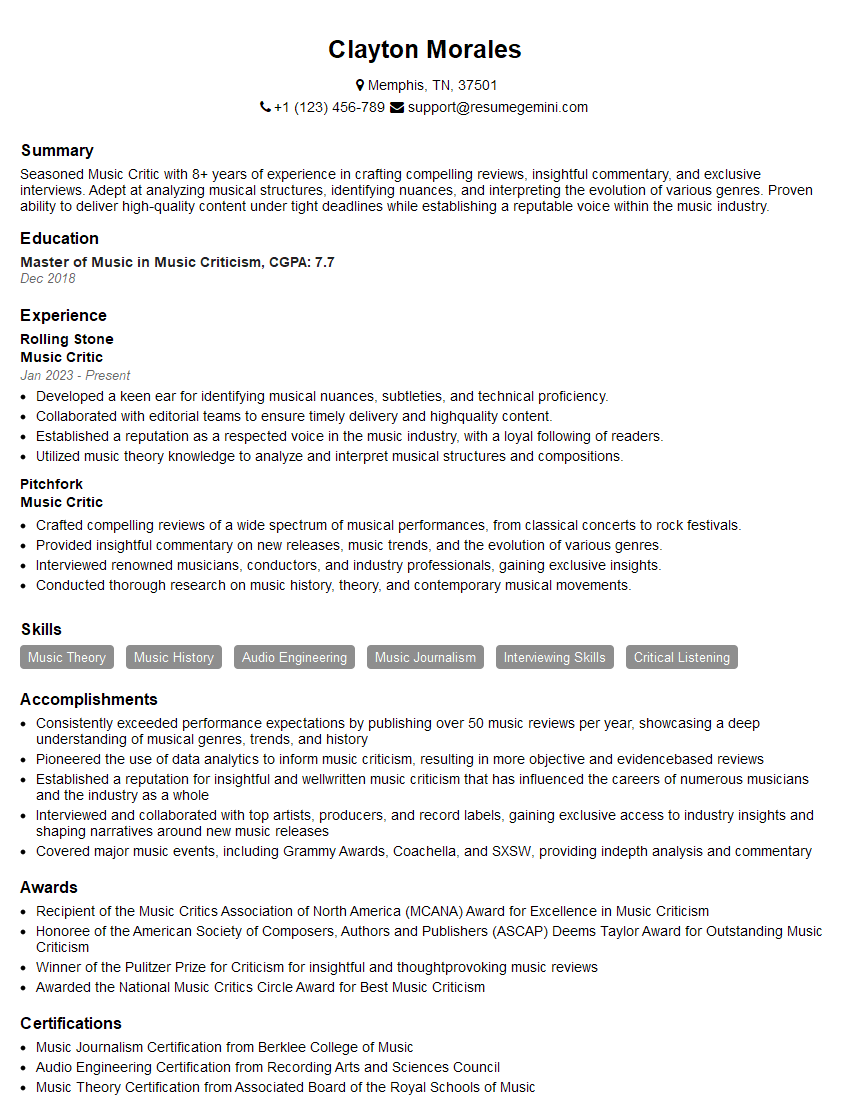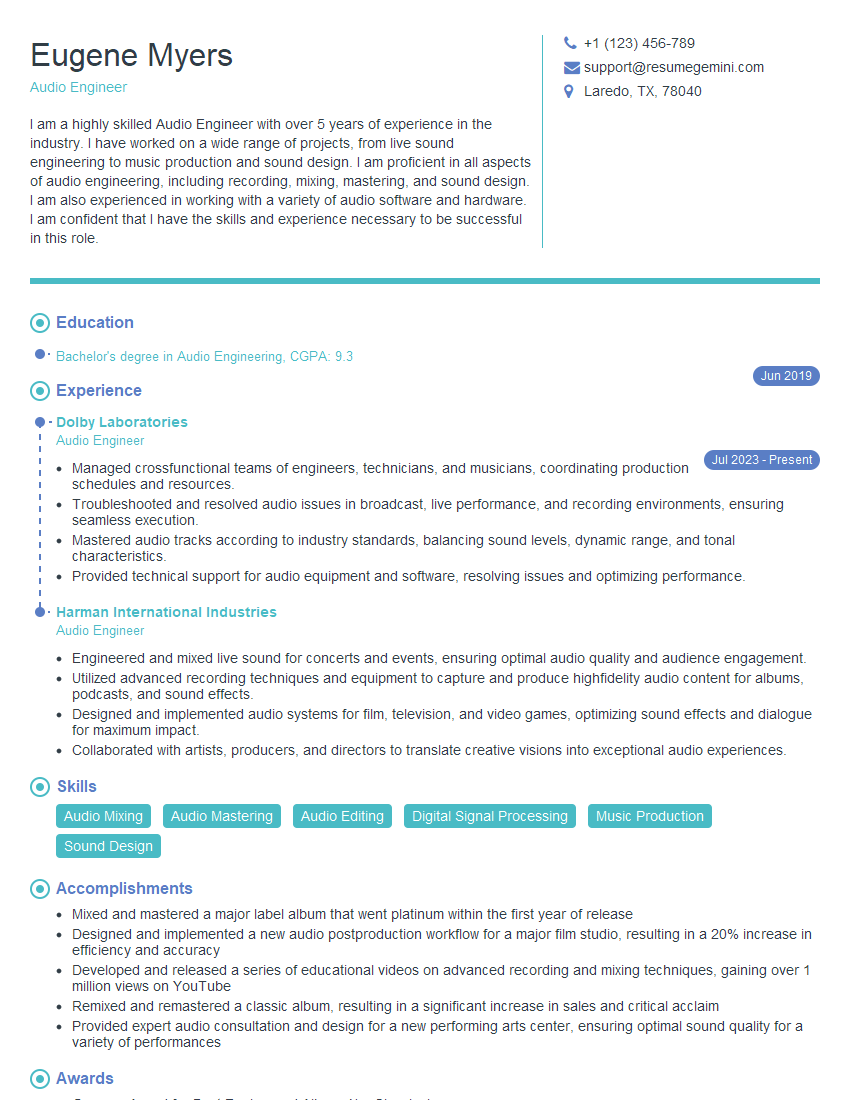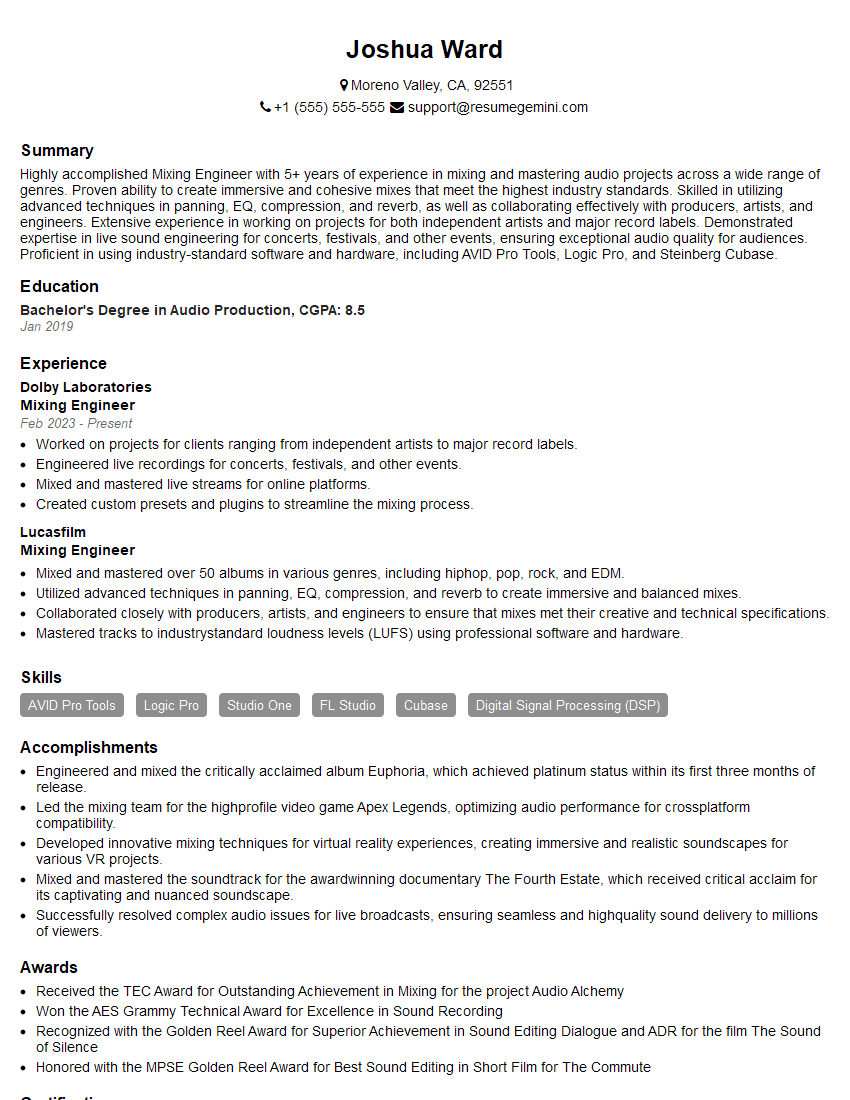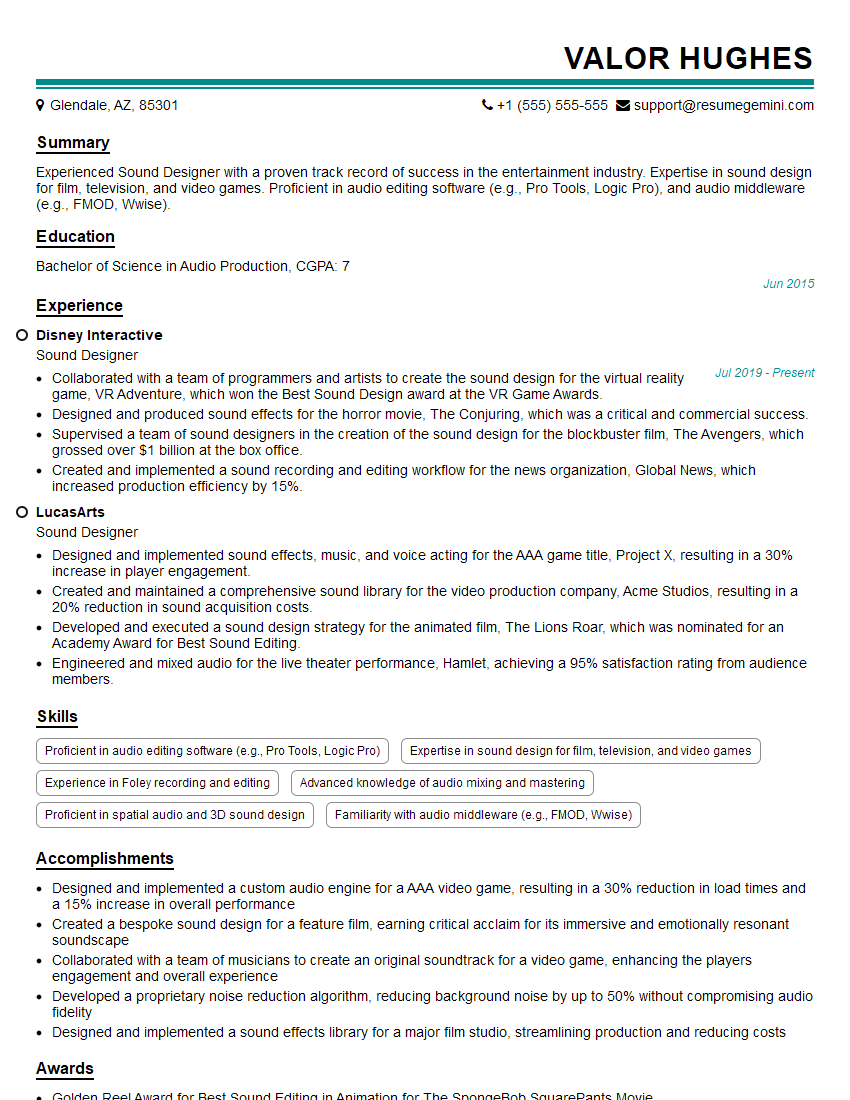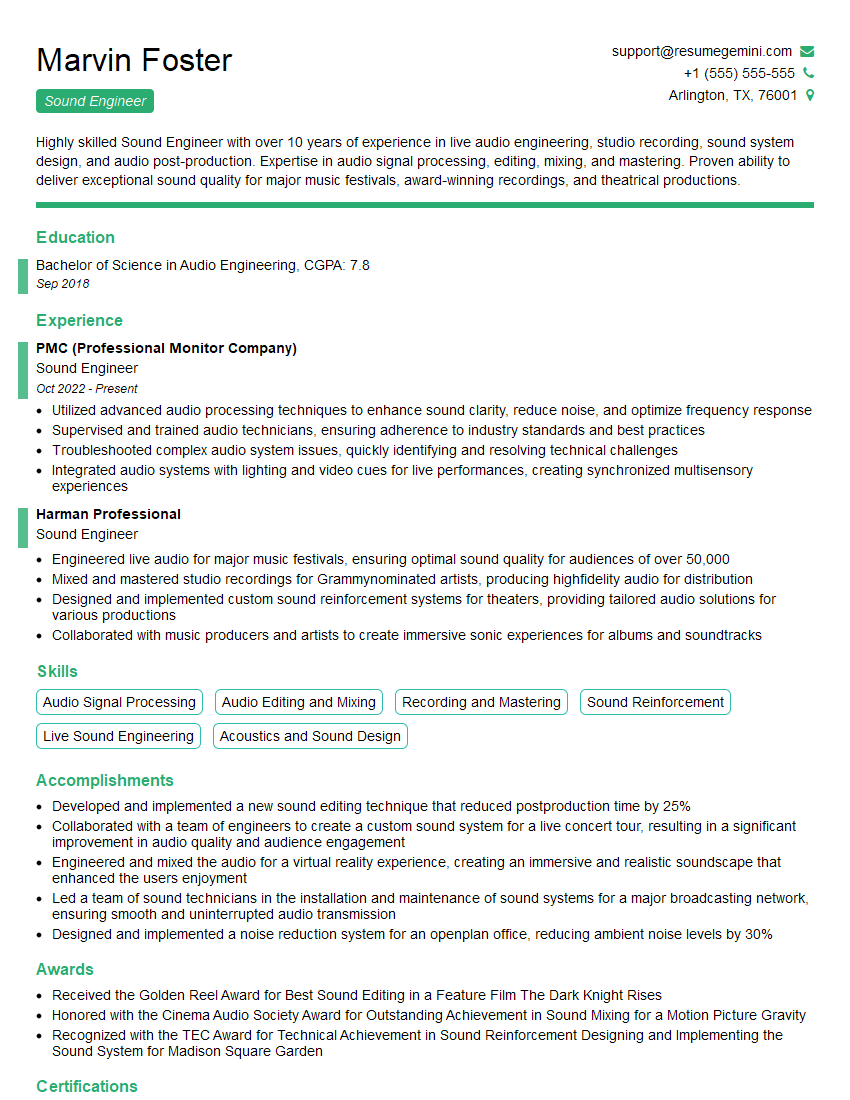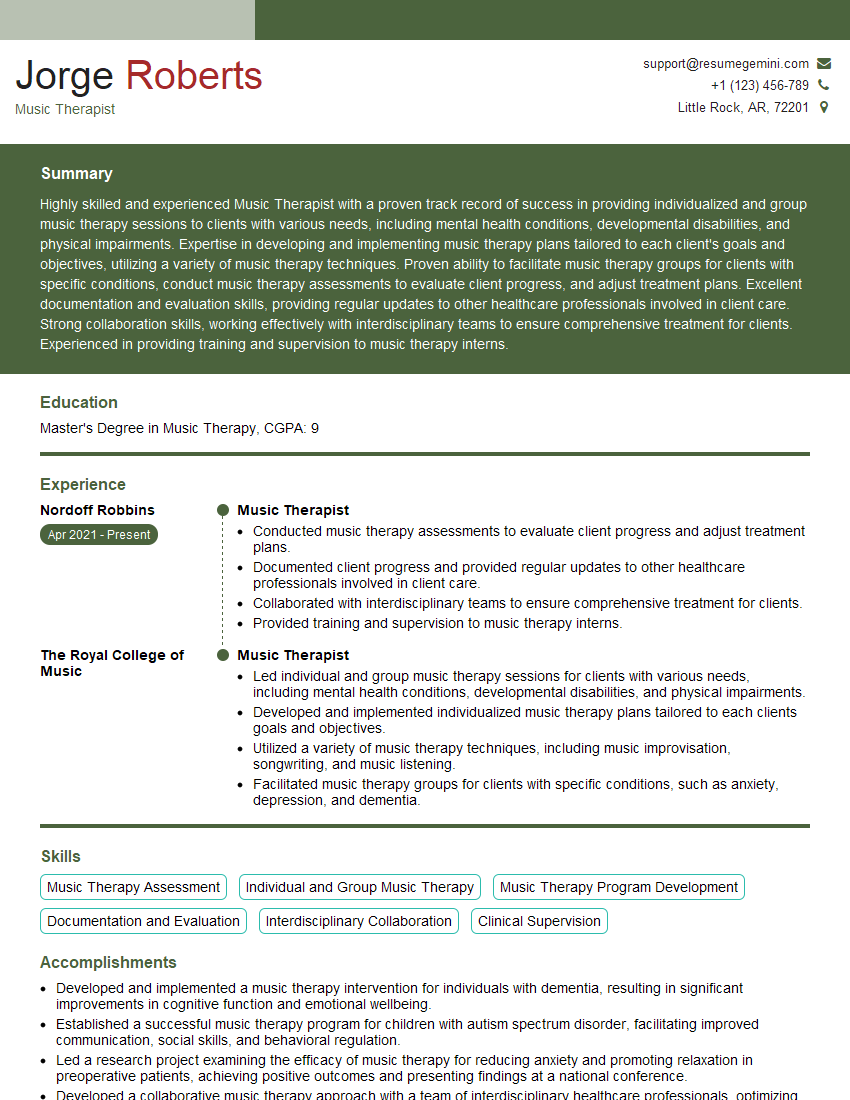Cracking a skill-specific interview, like one for Passion for Music, requires understanding the nuances of the role. In this blog, we present the questions you’re most likely to encounter, along with insights into how to answer them effectively. Let’s ensure you’re ready to make a strong impression.
Questions Asked in Passion for Music Interview
Q 1. Describe your experience with different music genres and styles.
My passion for music spans a wide range of genres and styles. I’ve spent years actively listening to and studying music from classical compositions to modern electronic dance music (EDM), incorporating elements of jazz, blues, rock, and hip-hop along the way. This broad exposure isn’t just about passive listening; it’s deeply informed my understanding of musical structures, instrumentation, and the emotional impact of different sonic palettes. For instance, I’ve learned the intricate harmonic progressions of classical composers like Bach, the improvisational freedom of jazz artists like Miles Davis, and the rhythmic complexity of Afrobeat pioneers like Fela Kuti. This diverse musical diet has significantly shaped my compositional approach, allowing me to blend elements from various genres to create unique and innovative soundscapes.
- Classical: Appreciating the structure and counterpoint in Bach’s fugues informs my understanding of harmonic sophistication.
- Jazz: Studying improvisation techniques in Miles Davis’ work has enhanced my ability to create spontaneous and expressive musical ideas.
- Electronic: My familiarity with EDM production techniques allows me to incorporate cutting-edge sounds and production styles into my compositions.
Q 2. What are your preferred methods for music composition/production?
My preferred methods for music composition and production involve a blend of analog and digital techniques. I begin with a strong conceptual phase, outlining the emotional arc and overall aesthetic of the piece. This often involves sketching melodies and harmonies on piano or guitar, capturing ideas quickly before they fade. Then, I move to my Digital Audio Workstation (DAW), primarily Ableton Live, where I meticulously arrange and refine my ideas. I heavily utilize virtual instruments – carefully selecting sounds that best communicate the intended mood and atmosphere. I might layer synths for lush textures, incorporate sampled instruments for authentic sounds, or use MIDI controllers for dynamic performance control. Throughout the process, I constantly revisit the conceptual phase, ensuring that the sonic details consistently support the emotional core of the composition.
For example, if I’m composing a melancholic piece, I might start with a simple, minor key melody on the piano, then build it up in Ableton with layered pads, atmospheric reverb, and subtle string samples. Each decision about instrumentation and sound design is driven by the overarching emotional intention.
Q 3. Explain your understanding of music theory (e.g., harmony, rhythm, melody).
My understanding of music theory is foundational to my creative process. I have a strong grasp of melody, harmony, and rhythm, understanding their interplay in creating engaging and emotionally resonant music.
- Melody: I understand how melodic contours create mood and emotional impact, employing techniques like sequencing, motifs, and variation to keep melodies interesting and memorable. I recognize the importance of melodic phrasing and the use of leaps and steps to create contrast and tension.
- Harmony: I am proficient in chord progressions, scales, and key signatures, utilizing them to build harmonic tension and release within my compositions. I understand the nuances of different chord qualities – major, minor, augmented, diminished – and how their use shapes emotional expression. My knowledge extends to advanced harmonic concepts like modal interchange and secondary dominants.
- Rhythm: I understand various rhythmic patterns, time signatures, and syncopation, using them to create groove, drive, and complexity. I am adept at creating rhythmic interest through polyrhythms and metric modulation.
Thinking of it like building a house, melody is the structure, harmony is the foundation, and rhythm is the heartbeat.
Q 4. How do you stay updated on current trends in the music industry?
Staying updated on current trends is vital in the music industry. I actively engage with several methods: I regularly listen to a wide range of new releases across different genres through streaming services and curated playlists. I follow key music blogs, magazines, and social media influencers who provide insights into emerging artists and trends. Attending industry conferences and workshops also allows me to directly interact with professionals and learn about cutting-edge technologies and production techniques. Moreover, I analyze the charts and understand what is resonating with audiences, but always maintaining my own creative individuality.
For example, I might notice a resurgence of a specific sound or production technique through consistent observation across different platforms and then explore how to incorporate it effectively into my work, creating a unique spin rather than simple replication.
Q 5. What software and hardware are you proficient with (e.g., DAWs, instruments)?
My proficiency extends to several software and hardware tools. My primary DAW is Ableton Live, and I’m also familiar with Logic Pro X and Pro Tools. I’m proficient with a range of virtual instruments, including synthesizers (Native Instruments Massive, Serum), samplers (Kontakt), and orchestral libraries (Spitfire Audio). My hardware includes a MIDI keyboard controller, studio monitors (Adam Audio), and an audio interface (Focusrite). I’m also a competent player of several instruments, including piano, guitar, and bass, which informs my composition and production processes directly.
Q 6. Describe your process for identifying and resolving technical issues in music production.
Troubleshooting technical issues is an essential part of music production. My process is systematic: I begin by isolating the problem – is it a software glitch, hardware malfunction, or a mix issue? If it’s software-related, I check for updates, restart the DAW, and consult online resources or forums for solutions. Hardware problems might require testing different cables or equipment. For mix issues, I meticulously check individual tracks for clipping, phase cancellation, or frequency conflicts. I use tools like spectrum analyzers and oscilloscopes to identify and address specific problems. I document my troubleshooting steps and solutions, creating a knowledge base for future reference.
For example, if I hear a strange buzzing sound, I’ll systematically check each individual track’s inputs and outputs, check my audio interface connections, and even consider issues with power supply.
Q 7. How do you approach collaboration in a music project?
Collaboration is a cornerstone of my creative process. I approach collaboration with open communication and mutual respect. Before starting a project, I clearly define roles and responsibilities with my collaborators. We establish a shared vision for the project, outlining the overall aesthetic, style, and goals. Regular communication is essential – I actively seek feedback and incorporate suggestions where appropriate, always ensuring that the creative vision remains cohesive. I believe in a collaborative spirit where each individual’s unique talents contribute to the overall excellence of the final product. Conflict resolution is approached through open dialogue and compromise, prioritizing a respectful and productive work environment.
Q 8. What is your experience with music copyright and licensing?
Music copyright and licensing are crucial for protecting the intellectual property rights of musicians and ensuring they receive compensation for their work. Copyright protects the original composition and arrangement of a musical work, granting the creator exclusive rights to reproduce, distribute, perform, and display it. Licensing, on the other hand, grants permission to others to use copyrighted music under specific terms and conditions, often involving royalties or fees.
My experience encompasses understanding different types of licenses, such as mechanical licenses (for reproducing and distributing recordings), synchronization licenses (for using music in film or video), and performance licenses (for public performances). I’m familiar with navigating licensing agreements, ensuring proper attribution, and understanding the legal implications of copyright infringement. For example, I’ve worked on several projects where I’ve negotiated licenses for using pre-existing samples, ensuring we obtained the necessary permissions and paid appropriate royalties to the copyright holders. I’ve also assisted in the registration of original musical compositions with copyright organizations to protect my clients’ intellectual property.
Q 9. Explain your understanding of music marketing and promotion.
Music marketing and promotion are essential for bringing music to a wider audience. It’s about strategically connecting with listeners and building a fanbase. My understanding encompasses a multifaceted approach. It begins with identifying the target audience – who are we trying to reach? Then, we develop a tailored strategy incorporating various channels.
- Digital Marketing: This includes utilizing platforms like Spotify, Apple Music, YouTube, and social media (Instagram, TikTok, Facebook) to engage with fans, release music, run targeted ads, and build online communities. For instance, I’ve utilized data analytics to optimize campaign targeting on social media, leading to increased engagement and stream counts.
- Public Relations: Securing media coverage through press releases, interviews, and collaborations with music bloggers and reviewers helps build credibility and brand awareness.
- Live Performances: Playing gigs at appropriate venues and festivals allows direct connection with the audience and builds a loyal following. I’ve helped artists organize successful tour schedules, booking venues and managing marketing materials for events.
- Email Marketing: Developing and maintaining an email list allows for direct communication with fans about new releases, shows, and other important updates.
Success in music marketing relies on consistent effort, data analysis to gauge campaign effectiveness, and adaptability to emerging trends and platforms.
Q 10. How do you handle constructive criticism of your musical work?
Constructive criticism is invaluable for growth. I approach it with an open mind, focusing on learning and improvement. My process involves:
- Active Listening: I carefully consider the feedback, seeking to understand the critic’s perspective, even if I don’t agree with it initially.
- Objective Assessment: I separate subjective opinions from objective observations. Is the criticism based on technical aspects, emotional impact, or personal preference?
- Seeking Clarification: If aspects of the feedback are unclear, I don’t hesitate to ask for further explanation.
- Implementation: Based on the objective aspects of the feedback, I identify areas for improvement and work on incorporating the suggestions into my future projects. This could involve technical adjustments to the mix, changes in arrangement, or refining lyrical content.
- Documentation: I keep a record of the feedback received, both positive and negative, to track progress and identify recurring themes or weaknesses.
For example, a critic once noted a lack of dynamic range in one of my tracks. I analyzed the mix, adjusted the compression, and added more subtle variations in volume, resulting in a more engaging and dynamic final product. This experience taught me the importance of dynamic contrast in my music.
Q 11. Describe a project where you overcame a significant challenge.
One significant challenge I overcame involved producing a complex orchestral piece with a tight deadline and a limited budget. The project required coordinating numerous musicians, securing rehearsal space, and managing the recording and mixing processes efficiently.
The challenge was amplified by the fact that several musicians were located across different countries, making in-person collaboration impossible. I overcame this by effectively leveraging digital audio workstations (DAWs), cloud-based collaboration tools, and detailed, meticulously planned score distribution and communication protocols. This ensured smooth communication and efficient collaboration despite the geographical distances. Furthermore, I carefully managed the project budget by exploring cost-effective options for studio time and outsourcing some tasks like transcription and score preparation.
This project taught me the importance of meticulous planning, proactive problem-solving, and effective communication in large-scale projects. The final product was critically acclaimed, and the experience significantly enhanced my project management skills.
Q 12. What is your approach to music editing and mastering?
My approach to music editing and mastering is meticulous and detail-oriented. Editing involves cleaning up the audio, removing unwanted noises or clicks, and ensuring the timing and arrangement are precise. I utilize DAWs such as Pro Tools or Logic Pro X, employing various tools like time-stretching, pitch correction, and noise reduction plugins. This stage aims for a clean and polished sonic foundation. Mastering, on the other hand, involves the final polishing and preparation of the track for distribution. It’s about achieving a consistent sound across all platforms, ensuring optimal loudness without compromising clarity or dynamics. I use specialized mastering plugins and often work with professional mastering engineers for projects demanding the highest quality.
For instance, in editing, I might use a de-esser to reduce sibilance (hissing sounds) on vocals, or a gate to remove background noise. During mastering, I might employ EQ to sculpt the overall frequency balance, compression to control dynamics, and limiting to optimize loudness while maintaining clarity and preventing clipping. This ensures the final product is optimized for various playback systems and listening environments.
Q 13. How do you ensure the quality of your musical output?
Ensuring the quality of my musical output involves a multi-stage process emphasizing both technical proficiency and artistic vision. The process begins with careful planning and composition, paying close attention to detail in every aspect—melody, harmony, rhythm, and arrangement. This includes refining the composition thoroughly before recording, paying attention to both musicality and technical accuracy. The recording process is equally important, using high-quality microphones and equipment, carefully placing microphones for optimum sound capture, and utilizing proper recording techniques. This attention to detail minimizes issues that could require excessive editing later. After recording, I engage in careful editing to correct any errors, remove noise, and further refine the mix. Regular listening sessions throughout the process allow for objective evaluation and refinement of the overall sound. Finally, mastering ensures the final product is optimized for different playback environments.
For example, I might record multiple takes of a vocal performance and choose the best one for clarity and emotional expression. I consistently monitor my work with different playback devices and in various acoustic environments to ensure it holds up well across diverse setups.
Q 14. Explain your experience with different audio mixing techniques.
My experience encompasses a wide range of audio mixing techniques, encompassing both analog and digital approaches. I’m proficient in various mixing styles, adapting my technique to suit the genre and artistic vision. This includes familiarity with equalisation (EQ), compression, reverb, delay, and other effects processing techniques. I also use different panning techniques to create a sense of space and depth in the mix, tailoring the sound for different speaker setups (stereo, surround sound).
For example, I’ve worked on projects requiring a vintage analog sound, utilizing analog equipment and emulation plugins to achieve a specific aesthetic. In contrast, other projects demanded a modern, crisp sound, necessitating a different approach using digital plugins and focusing on clarity and precision. Understanding the principles of frequency balance, dynamic range, and stereo imaging is crucial in achieving a well-balanced and impactful mix. My approach emphasizes achieving a mix that not only sounds great but also translates well across different listening environments and playback systems.
Q 15. Describe your understanding of different recording techniques.
Recording techniques are the methods used to capture and process sound to create a musical recording. They range from simple, lo-fi methods to highly sophisticated, multi-track productions. Understanding these techniques is crucial for achieving a desired sonic outcome.
- Mono vs. Stereo Recording: Mono uses a single microphone, creating a single channel of audio. Stereo utilizes multiple microphones to capture a wider soundstage, offering depth and spatial separation. Think of mono as a single spotlight on the performer, while stereo is more like a broad, well-lit stage. Mono is simpler, stereo offers more realism.
- Microphone Techniques: The placement and type of microphone significantly impact the sound. Close miking emphasizes detail and clarity, while distant miking captures the ambience of a room. Different microphone polar patterns (cardioid, omnidirectional, figure-eight) affect which sounds are captured and how they are balanced. For example, a close-miked vocal track will be clear and dry, while a room-mic’d acoustic guitar will capture the natural resonance of the instrument and the surrounding space.
- Multi-track Recording: This allows for recording individual instruments or vocals separately onto distinct tracks. This offers flexibility in editing, mixing, and post-production. It’s like having a palette of individual colors that you can blend later to create a richer and more nuanced soundscape.
- Digital Audio Workstations (DAWs): Software like Pro Tools, Logic Pro X, Ableton Live, etc., are used to record, edit, mix, and master audio. These provide vast capabilities for manipulating sound, including adding effects, automation, and creating complex arrangements. A DAW is like a sophisticated paintbrush, allowing for intricate control over the final product.
- Signal Processing: Equalization (EQ), compression, reverb, delay, and other effects are used to shape and enhance the sound. EQ adjusts the balance of different frequencies; compression reduces dynamic range; reverb simulates the sound of a room; delay adds echoes. These are like artistic tools for sculpting and polishing the final audio.
Career Expert Tips:
- Ace those interviews! Prepare effectively by reviewing the Top 50 Most Common Interview Questions on ResumeGemini.
- Navigate your job search with confidence! Explore a wide range of Career Tips on ResumeGemini. Learn about common challenges and recommendations to overcome them.
- Craft the perfect resume! Master the Art of Resume Writing with ResumeGemini’s guide. Showcase your unique qualifications and achievements effectively.
- Don’t miss out on holiday savings! Build your dream resume with ResumeGemini’s ATS optimized templates.
Q 16. What are your strengths and weaknesses as a musician?
My strengths as a musician lie in my strong melodic sense, my ability to improvise effectively, and my dedication to collaboration. I’m comfortable performing in a variety of settings, and I’m always eager to learn and experiment with new styles and techniques. For example, I recently collaborated on a project that blended traditional folk music with electronic elements, which significantly expanded my musical horizons.
However, I acknowledge that my weakness lies in a sometimes-overly perfectionistic approach to my work. While this desire for excellence is often beneficial, it can occasionally lead to procrastination and self-criticism. I’m actively working to improve time management and self-compassion in my creative process.
Q 17. How do you manage your time and prioritize tasks in a musical project?
Managing time and prioritizing tasks in a musical project requires a structured approach. I typically start with a detailed project plan that outlines all tasks, deadlines, and milestones. I then break down large tasks into smaller, manageable chunks. This granular approach helps me stay focused and avoid feeling overwhelmed.
I utilize project management tools like Trello or Asana to visually track progress and ensure accountability. I allocate specific time blocks for composing, recording, mixing, and other activities. Regular reflection and adjustment of the plan are crucial for accommodating unexpected issues and maintaining momentum. Prioritization is key, ensuring that critical tasks, such as meeting deadlines for recordings or performances, are addressed first. I also build in buffer time to account for unforeseen technical difficulties or creative blocks.
Q 18. How do you handle pressure and deadlines in a creative environment?
Pressure and deadlines are inherent aspects of the creative environment. My approach to handling them involves a proactive strategy focused on preparation and efficient workflow. Firstly, I meticulously plan and schedule my work to avoid last-minute rushes. Secondly, I practice mindfulness and stress-reduction techniques to maintain a calm and focused mindset during periods of high pressure. Thirdly, open communication with collaborators and clients is crucial; transparently discussing any potential challenges allows for timely solutions and prevents misunderstandings.
For example, when faced with a tight deadline for a live performance, I ensure all logistical aspects are handled well in advance—rehearsals are scheduled efficiently, equipment is checked, and travel arrangements are finalized. This organized approach mitigates stress and allows me to focus on the creative aspects of the performance.
Q 19. Describe your experience with live music performance.
I have extensive experience performing live music in various settings, from intimate coffee shops to larger concert halls. My experience includes both solo performances and collaborations with bands. I’ve learned to adapt my performance style to different venues and audiences. I understand the importance of stage presence, audience engagement, and technical proficiency in ensuring a successful live show.
A memorable experience involved a surprise guest appearance at a festival. The spontaneous nature of the event challenged my adaptability, but my strong improvisational skills and experience with diverse musical styles allowed me to seamlessly integrate into the performance.
Q 20. What is your familiarity with music notation software?
I’m proficient in several music notation software programs, including Sibelius and Finale. I’m comfortable creating and editing scores, parts, and other musical notation. I can also import and export files in various formats, ensuring seamless compatibility across different platforms and collaborators. My skills extend beyond basic notation to encompass more advanced features like engraving, playback, and score analysis. These skills allow me to work effectively with composers and arrangers, creating accurate and aesthetically pleasing musical scores.
For example, I recently used Sibelius to create a detailed orchestral score for a film project, employing its advanced capabilities to meticulously create and edit complex musical arrangements.
Q 21. What are your career goals in the music industry?
My career goals involve establishing myself as a versatile and sought-after musician in the industry. This involves broadening my performance experience, collaborating on diverse and challenging projects, and potentially teaching music to share my passion and expertise. Long-term, I aspire to contribute to the musical landscape by producing my own music and potentially composing scores for film or video games. Ultimately, my career goal is to utilize my musical abilities to create meaningful experiences and connect with people through the universal language of music.
Q 22. Explain your understanding of music business principles.
The music business is a multifaceted industry encompassing the creation, production, distribution, and marketing of music. It’s not just about making music; it’s a complex interplay of artistic vision and shrewd business strategies. Key principles include understanding copyright and intellectual property rights, which protect artists’ work and enable them to profit from it. Effective marketing and promotion are crucial, utilizing various platforms like streaming services, social media, and traditional media to reach audiences. This also involves building a strong brand identity and cultivating a dedicated fanbase. Another critical aspect is revenue generation through various avenues such as album sales, streaming royalties, live performances, merchandise, and licensing. Financial management, including budgeting, accounting, and contract negotiation, is essential for sustainable growth. Finally, effective artist management plays a significant role in guiding an artist’s career, navigating industry complexities, and maximizing their potential.
For example, a successful artist doesn’t just record great songs; they strategically release them on major platforms, engage fans online, and negotiate favorable deals with record labels. A well-managed band understands their target audience, uses data-driven marketing to reach them effectively, and diversifies their revenue streams to ensure long-term sustainability.
Q 23. How do you maintain your passion for music over time?
Maintaining my passion for music over time requires a multi-pronged approach. First, continuous learning is key. I actively seek out new artists, genres, and musical experiences to expand my horizons and keep things fresh. This includes attending live concerts, listening to diverse music, attending workshops, and engaging in musical collaborations. Secondly, I create space for self-expression and creativity. Whether it’s playing an instrument, composing new music, or simply listening to my favourite pieces, engaging in active musical exploration fuels my passion. Thirdly, connecting with a supportive community is vital. Interacting with fellow musicians, attending industry events, and engaging with music enthusiasts keeps me inspired and motivated. Finally, embracing the challenges and embracing evolution within the music industry helps maintain a sense of excitement and exploration, rather than viewing it as a stagnant field.
Q 24. Describe your experience with different musical instruments.
My musical journey has encompassed a variety of instruments. I began with the piano at age seven, learning classical techniques and developing a strong foundation in music theory. This provided a solid base for understanding harmony, rhythm, and composition. Later, I picked up the guitar, finding its versatility appealing for different genres. The guitar allowed me to explore various styles from blues to rock, and enhanced my understanding of improvisation. I also experimented with percussion instruments, particularly drums, gaining an appreciation for rhythmic complexity and the visceral energy of rhythmic interplay within a band. Each instrument has offered unique insights into the creation and expression of music.
Q 25. What is your experience with music education?
My music education has been a blend of formal training and self-directed learning. I hold a Bachelor’s degree in Music from [University Name], where I focused on music theory, history, and composition. This provided a rigorous academic foundation, equipping me with a deep understanding of musical structures and historical contexts. Beyond formal education, I have actively pursued private lessons with experienced musicians, honing my instrumental skills and expanding my musical repertoire. I also regularly engage in workshops and masterclasses, seeking out opportunities for continuous improvement and exposure to diverse teaching styles and perspectives.
Q 26. How do you approach music analysis and interpretation?
Music analysis and interpretation is a process of deep listening and critical engagement. It involves dissecting the various layers of a musical work – melody, harmony, rhythm, form, and texture – to understand its underlying structure and expressive intent. I approach this by first listening actively, repeatedly if necessary, to internalize the emotional impact and overall message of the piece. Then, I meticulously analyze the musical elements, considering the composer’s context, historical background, and possible influences. This often involves using music theory concepts and notation software to chart progressions and identify key structural elements. Interpretation goes beyond mere technical analysis; it’s about uncovering the emotional and artistic meaning embedded within the music and translating that for the audience. This might involve considering the historical context, the composer’s intentions, or even personal experiences to develop a nuanced understanding and interpretation. This process allows one to articulate what makes a piece of music meaningful and powerful.
Q 27. Explain your understanding of audio signal processing.
Audio signal processing is the manipulation of audio signals to alter their characteristics. This involves using digital signal processing (DSP) techniques to modify parameters such as amplitude, frequency, and time. Common applications include equalization (EQ), which adjusts the balance of frequencies; compression, which reduces the dynamic range; and reverb, which simulates the acoustic properties of a space. These techniques are used extensively in music production, recording, and mastering to enhance audio quality and creative expression. For instance, EQ can be used to highlight certain instruments in a mix, compression can add punch and clarity to a drum sound, and reverb can create a sense of space and depth. Understanding DSP principles is essential for producing professional-sounding recordings and mastering tracks effectively. A good understanding of concepts like Fast Fourier Transforms (FFT) and digital filtering is a must for someone involved in the production of music.
For example, a mastering engineer might use a compressor to reduce the dynamic range of a track, making it louder and more consistent across different playback systems. Similarly, an audio engineer might use an EQ to boost the bass frequencies of a recording, making it sound more powerful and full.
Q 28. Describe your experience with music therapy techniques (if applicable).
While I don’t have formal qualifications in music therapy, I have a strong interest in its potential. I understand that music therapy uses music as a means to achieve therapeutic goals. This can involve active music-making or simply listening to music to improve mental health and well-being. Techniques often used include improvisation, songwriting, and guided listening experiences. The goal is often to help individuals manage stress, anxiety, or depression; improve communication and social skills; express emotions; and foster self-awareness. Music therapy can be incredibly beneficial for individuals of all ages and with various conditions. I believe it’s a powerful tool with the potential to positively impact emotional and psychological wellbeing, and I find the research in this field fascinating.
Key Topics to Learn for Your Passion for Music Interview
- Music Theory Fundamentals: Understanding basic music theory concepts like scales, chords, rhythm, and melody is crucial. Consider how these elements contribute to different musical styles and genres.
- Genre Expertise: Demonstrate a deep understanding of at least one specific musical genre. Be prepared to discuss its history, key artists, and defining characteristics. Show how your passion aligns with this genre.
- Music Technology & Production: Familiarize yourself with common music production software (DAWs) and recording techniques. Discuss your experience with any relevant tools or your eagerness to learn.
- Music Business & Industry Knowledge: Understand the different aspects of the music industry, including copyright, licensing, marketing, and distribution. Consider how your skills can contribute to the success of a musical project.
- Performance & Presentation Skills: If applicable to the role, demonstrate your ability to confidently present your musical ideas and knowledge. Practice articulating your thoughts clearly and concisely.
- Collaboration & Teamwork: Discuss your experience working with others in a musical setting. Highlight your communication skills and ability to contribute to a team effort.
- Problem-Solving in Music: Be prepared to discuss how you approach creative challenges in music. Explain how you overcome obstacles and find innovative solutions.
- Adaptability and Learning Agility: The music industry is constantly evolving. Show your willingness to adapt to new technologies, trends, and challenges.
Next Steps
Mastering these key areas will significantly enhance your prospects in the music industry. A strong understanding of music theory, technology, and the business side of the industry is invaluable for career growth. To further improve your chances, create an ATS-friendly resume that highlights your skills and experience effectively. ResumeGemini is a trusted resource that can help you build a professional and impactful resume. Examples of resumes tailored to careers in Passion for Music are available to help you get started.
Explore more articles
Users Rating of Our Blogs
Share Your Experience
We value your feedback! Please rate our content and share your thoughts (optional).
What Readers Say About Our Blog
Hello,
We found issues with your domain’s email setup that may be sending your messages to spam or blocking them completely. InboxShield Mini shows you how to fix it in minutes — no tech skills required.
Scan your domain now for details: https://inboxshield-mini.com/
— Adam @ InboxShield Mini
Reply STOP to unsubscribe
Hi, are you owner of interviewgemini.com? What if I told you I could help you find extra time in your schedule, reconnect with leads you didn’t even realize you missed, and bring in more “I want to work with you” conversations, without increasing your ad spend or hiring a full-time employee?
All with a flexible, budget-friendly service that could easily pay for itself. Sounds good?
Would it be nice to jump on a quick 10-minute call so I can show you exactly how we make this work?
Best,
Hapei
Marketing Director
Hey, I know you’re the owner of interviewgemini.com. I’ll be quick.
Fundraising for your business is tough and time-consuming. We make it easier by guaranteeing two private investor meetings each month, for six months. No demos, no pitch events – just direct introductions to active investors matched to your startup.
If youR17;re raising, this could help you build real momentum. Want me to send more info?
Hi, I represent an SEO company that specialises in getting you AI citations and higher rankings on Google. I’d like to offer you a 100% free SEO audit for your website. Would you be interested?
Hi, I represent an SEO company that specialises in getting you AI citations and higher rankings on Google. I’d like to offer you a 100% free SEO audit for your website. Would you be interested?
good
